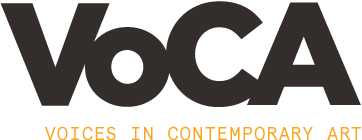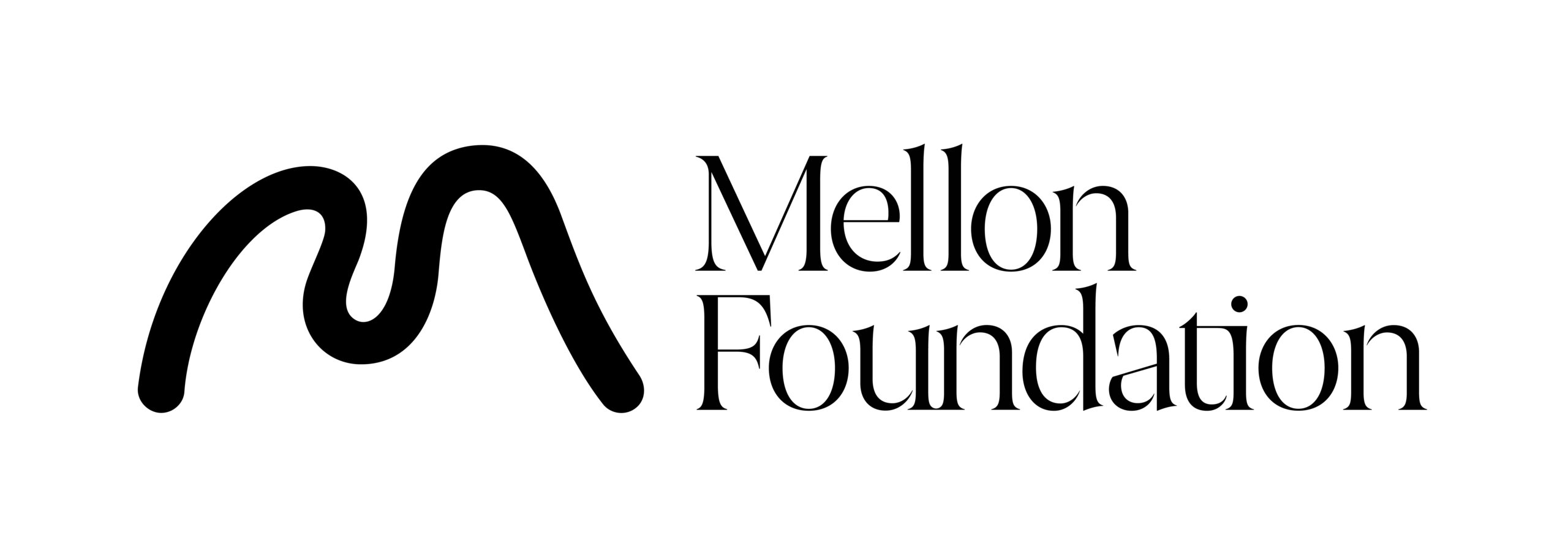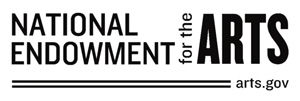ARTIST INTERVIEW WORKSHOPS
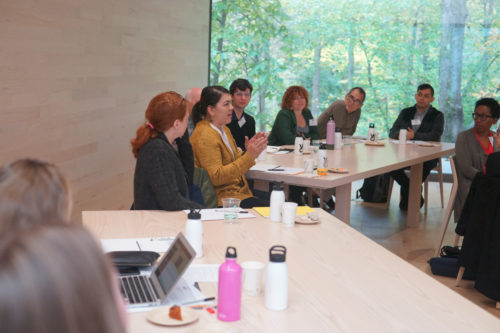
Our latest virtual Artist Interview Workshop was held on January 24-26, 2024. For additional information regarding future Workshops, please subscribe to our monthly newsletter, or reach out to our Program Consultant Pablo Quiros Garcia at pablo@voca.network with further questions.
The Artist Interview Workshops aim to provide conservators, curators, educators, and other arts professionals at all stages of their careers with a greater understanding of the methods and skills needed to conduct successful artist interviews.
With support from the Mellon Foundation, the Workshop was developed in response to a cross-disciplinary appeal from arts professionals seeking to engage in thoughtful, guided conversations with artists and to share the outcomes of these projects with their peers. At its inception, the program offered arts professionals a unique learning opportunity to connect with a diverse group of colleagues and gain some of the core skills needed to conduct successful interviews with artists. Over the years the conversation has evolved, moving beyond methodology and the exploration of why interviews are an essential component of contemporary art preservation. Today, the workshops investigate the very nature of stewardship, probe the contours of memory, review best practices for recording and archiving interviews, and consider the legal frameworks for their use.
The structure of the workshops has been crafted by VoCA on a model developed by VoCA Board members Richard Cándida Smith and Jill Sterrett. Their respective experiences in oral history and museum-based interview programs produced a rigorous, instructive, and interactive agenda. Over the course of two to three days, various presenters conduct a series of lectures and case studies which are then analyzed via roundtable discussion and tested in small group exercises. Speakers also facilitate conversations with other presenters and attendees, addressing their own experiences, the different approaches interviewers can take, and common challenges in the process.
Since 2012, VoCA’s Artist Interview Workshops have served over 700 arts professionals from more than 250 institutions worldwide. We look forward to growing this number and reaching our new colleagues across the globe.
In January 2018, we hosted a VoCA Summit to mark and measure six years of this signature program; for more information, go to http://summit.voca.network/.
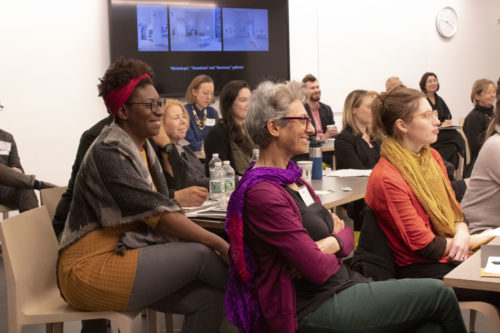
Artist Interview Workshop held at The Museum of Modern Art (MoMA) in 2019.
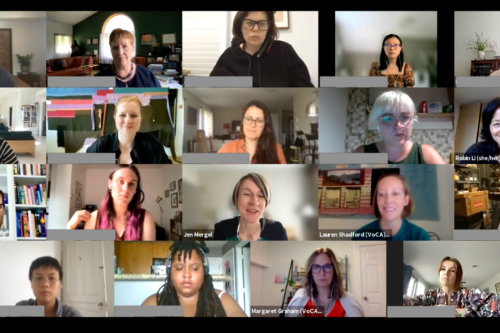
Virtual Artist Interview Workshop held via Zoom in 2021.
WHAT WE OFFER
EDUCATION
As stewards of contemporary collections, many of us are expected to conduct interviews without any training, and are left feeling uncertain about how to approach the task. Our curriculum not only provides a basic knowledge of interview techniques but also explores pre-interview preparation, engaged listening, guided conversations, and keys to relationship-building. In addition to teaching these skills, this workshop is an opportunity for colleagues to share their experiences and learn from the shared challenges they face.
Obtaining relevant information from guided conversations is just one piece of a complex puzzle. For most museum and art-related fields, there are also the added layers of how to implement, store, and disseminate the data gathered in an interview. Since the answers to these questions are hardly black and white, VoCA’s workshops encourage participants to examine the grey area, considering how the narrative of a contemporary work and the artist’s intention can change over time, and the ways the model of stewardship is shifting with it.
SUSTAINABILITY
In every instance, we feel that the workshop is just a beginning. We hope that the relationships and conversations continue beyond the workshop itself and stimulate innovative programs that amplify the artist’s voice.
SPECIALIZATION
The workshop module is tailored to each group to accommodate their individual experiences and concerns. Using the established framework as our foundation, we work closely to craft a workshop agenda that addresses the questions and topics that are of greatest interest and relevance to the participants.
Since the beginning of the COVID pandemic, and as the need for robust digital programming continues to grow, VoCA has adapted the workshop module to a virtual format with great success. Going forward, we will aim to host these workshops both virtually and in-person, and are committed to collaborating with our partners to find the arrangement that best suits their needs.
COMMUNITY BUILDING
These workshops provide an open, collaborative space where thought-leaders from all arts disciplines and departments can come together to find common ground, and dig deep into the questions of legacy, materiality, and meaning that drive our work. We at VoCA have learned a great deal from engaging in these dialogues, and it is our goal to spark the conversation in those communities and locations that are eager to join in.
This workshop was fabulous! VoCA has really fine-tuned the process, coming up with a fantastic and amazingly varied program that combines scholarly fascination, guided discussion, and free-form conversations that allow us to explore topics in-depth along with concrete examples that help us all learn.
Mina Thompson
Associate Conservator of Objects,
Museums of New Mexico
LEADERS
Richard Cándida Smith
Professor Emeritus of History,
University of California at Berkeley
Robin Li
Oral Historian & writer
Jen Mergel
Director of Experience and Cultural Partnerships,
Emerald Necklace Conservancy
Steven O’Banion
Director of Conservation,
Glenstone Museum
Peter Oleksik
Media Conservator,
Museum of Modern Art
Sam Redman
Associate Professor, Department of History,
University of Massachusetts Amherst
Jess Rigelhaupt
Associate Professor of History & American Studies,
University of Mary Washington
Gwynne Ryan
Freelance Conservator
Jill Sterrett
Independent arts & cultural heritage advisor
Glenn Wharton
Professor, Art History & Conservation of Material Culture,
University of California, Los Angeles
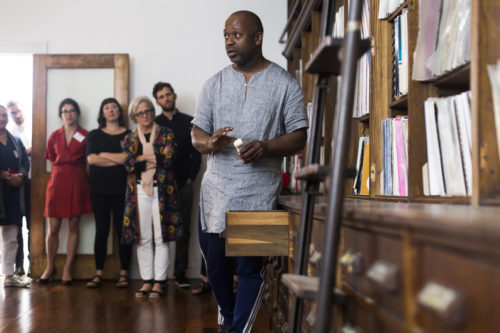
Participants enjoy a tour of the Stony Island Arts Bank lead by Theaster Gates during the Artist Interview Workshop held at the Rebuild Foundation in Chicago in 2017.
SPEAKERS
Chad Alligood
Independent Curator & Art Historian
Daniel Atkinson
Manager of Learning, Adult Interpretive Programs
Museum of Contemporary Art Chicago
Michael Auping
Former Chief Curator,
Modern Art Museum of Fort Worth
Julia Blaut
Director of Curatorial Affairs,
Robert Rauschenberg Foundation
Suzanne Deal Booth
Philanthropist, Art Advisor, Collector
Ruth del Fresno-Guillem
Conservator
Mikka Gee Conway
Chief Diversity, Inclusion, and Belonging Officer and EEO Director,
National Gallery of Art
Francesca Esmay
Director of Engagement, Conservation, and Collections Care
Solomon R. Guggenheim Museum
Theaster Gates
Artist & Founder,
Rebuild Foundation
Lauryn Guttenplan
Deputy General Counsel,
Smithsonian Institution
Andrea R. Hanley
Chief Curator,
Wheelwright Museum of the American Indian
Arlan Huang
Artist
Susan Lake
Collection Manager & Chief Conservator,
Hirshhorn Museum & Sculpture Garden
Thomas Lax
Associate Curator, Department of Media & Performance Art,
Museum of Modern Art
Tom Learner
Senior Scientist
Head of the Modern & Contemporary Art Research Initiative,
Getty Conservation Institute
Kate Lewis
Agnes Gund Chief Conservator,
Museum of Modern Art
Carol Mancusi-Ungaro
Associate Director of Conservation & Research,
Whitney Museum of American Art
James McElhinney
Artist & Oral Historian
Julie McGee
Associate Professor of Africana Studies and Art History
Director, Interdisciplinary Humanities Research Center,
University of Delaware
Sarah Melching
Director of Conservation,
Denver Art Museum
Kate Moomaw
Associate Conservator of Modern & Contemporary Art,
Denver Art Museum
Daisy Nam
Curator,
Ballroom Marfa
Shervone Neckles
Artist
Solveig Nelson
Art Critic & Curator
John Outterbridge
Artist & Activist
Anne Reeve
Associate Curator,
Hirshhorn Museum & Sculpture Garden
Rachel Rivenc
Head of Preservation & Conservation,
Getty Research Institute
Sarah Roberts
Andrew W. Mellon Foundation Associate Curator of Painting & Sculpture,
San Francisco Museum of Modern Art
Juan Roselione-Valadez
Director,
the Rubell Family Collection & Contemporary Art Foundation
Peter Samis
Associate Curator, Interpretative Media,
San Francisco Museum of Modern Art
Tessa Shultz
Assistant Project Manager,
Smithsonian National Museum of the American Indian
Yasmeen Siddiqui
Founder,
Minerva Projects
Lena Stringari
Deputy Director and Chief Conservator,
Solomon R. Guggenheim Museum
Gloria Sutton
Associate Professor of Contemporary Art History & New Media,
Northeastern University
Jeffrey Weiss
Senior Curator,
Solomon R. Guggenheim Museum
This workshop provided a full scope of the Artist Interview experience, from the logistical to overall purpose and intention, to the ethical and historical implications. I especially appreciated seeing how the theory of the interview is put into action on a modified budget with limited staff.
Shervone Neckles-Ortiz
Artist Support Manager,
Joan Mitchell Foundation
PARTNERS










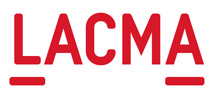




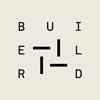

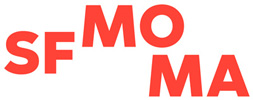

LEARN MORE
If you are interested in hosting or crafting a Workshop for your institution, or have any questions, you can email VoCA’s Program Director, Margaret Graham, at margaret@voca.network.
I sought a toolkit for the approach to the interview – what I received was a crash course in self-examination and the very nature of communication. The critical underpinnings of this kind of work were under discussion—we rarely have time in our profession to reflect on such things. What a treat.
Chad Alligood
Independent Curator & Art Historian
